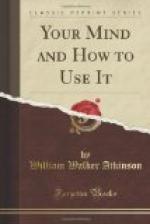“Cannon has collected various instances of the suspension of digestion in consequence of disagreeable experiences, and it would be easy for almost anyone to add to his list. He tells us, for example, of the case of a woman whose stomach was emptied under the direction of a specialist in order to ascertain the degree of digestion undergone by a prescribed breakfast. The dinner of the night before was recovered and was found almost unaltered. Inquiry led to the fact that the woman had passed a night of intense agitation as the result of misconduct on the part of her husband. People who are seasick some hours after a meal vomit undigested food. Apprehension of being sick has probably inhibited the gastric activities.
“Just as a single occasion of painful emotion may lead to a passing digestive disturbance, so continued mental depression, worry, or grief may permanently impair the working of the (alimentary) tract and undermine the vigor and capacity of the sufferer. Homesickness is not to be regarded lightly as a cause of malnutrition. Companionship is a powerful promoter of assimilation. The attractive serving of food, a pleasant room, and good ventilation are of high importance. The lack of these, so commonly faced by the lonely student or the young man making a start in a strange city, may be to some extent counteracted by the cultivation of optimism and the mental discipline which makes it possible to detach one’s self from sordid surroundings.”
Almost as important as eating is drinking, for liquids constitute the “largest item in the income” of the body. Free drinking is recommended by physiologists, the beneficial results being, “the avoidance of constipation, and the promotion of the elimination of dissolved waste by the kidneys and possibly the liver.” In regard to the use of water with meals, a point upon which emphatic cautions were formerly offered, recent experiments have failed to show any bad effects from this, and the advice is now given to drink “all the water that one chooses with meals.” Caution should be observed, however, about introducing hot and cold liquids into the stomach in quick succession.
Other liquids have been much discussed by dietitians, especially tea and coffee. “These beverages owe what limited food value they have to the cream and sugar usually mixed with them. They give pleasure by their aroma, but they are given a peculiar position among articles of diet by the presence in them of the compound caffein, which is distinctly a drug. It is a stimulant to the heart, the kidneys, and the central nervous system.”
“Individual susceptibility to the action of caffein varies greatly. Where one person notices little or no reaction after a cup of coffee, another is exhilarated to a marked degree and hours later may find himself lying sleepless with tense or trembling muscles, a dry, burning skin, and a mind feverishly active. Often it is found that a more protracted disturbance follows the taking of coffee with cream than is caused by black coffee.




